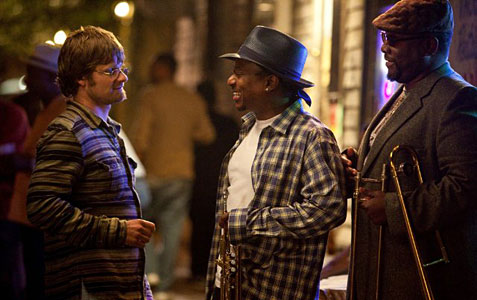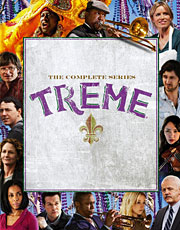Blu-ray Review: “Treme: The Complete Series”
If you were offered a trip to New Orleans for just over a hundred bucks, you’d probably take it, right? Well, it is perhaps oversimplifying matters to equate the “Treme: The Complete Series” box set (available exclusively on Blu-ray) with a visit to N’Awlins, but maybe that’s only because there’s nothing particularly simple about “Treme.” Does that mean it’s the sort of series that will blow you away? Not at all. Indeed, “Treme” has no interest in even trying.
For those who missed the series over the course of its HBO run (and judging by its practically invisible ratings, there were quite a few of you), “Treme” begins three months after Hurricane Katrina all but wiped out the city of New Orleans, and follows more than a dozen NOLA residents from all different walks of life picking up the pieces and attempting to move forward. It’s a series about culture, politics, cooking, tradition, and most definitely music, which it revels in. The show dazzles viewers with one great musical sequence after another (all recorded live and with no overdubbing or lip-synching), and the list of artists – usually playing themselves – that appear on the series over the course of its 36 episodes is practically countless.
In many (if not most) ways, “Treme” is anti-television. It seemingly throws out the rulebook that started being written when TV came into existence, playing loose, but rarely fast. There’s a price to pay for this brand of innovative storytelling, though, and that’s that “Treme” does not excite in any of the traditional ways that we’ve come to expect television to. Not once in the entire series will you throw your arms up and cry, “Yeah right! That would never happen!” such is the day to day reality of its goings-on. Indeed, when viewing it, you almost have to train yourself to watch this brand of TV a little differently.

On numerous occasions throughout the series’ run, I kept expecting it to deliver shocks and revelations of the sort that TV is so well known for, only to time and again find my expectations subverted by a series that’s primary mission appears to be to amble along at a pace weirdly similar to life. For the seasoned TV viewer bored of the status quo, this is a perfectly exhilarating notion in and of itself. By not seeking thrills, “Treme” somehow created something else entirely that we’ve never quite seen before, which itself is thrilling TV.
Now, none of this is to say that the series fails to deliver solid drama. People fight, fuck, divorce, celebrate, laugh, cry and die, and there are several times throughout the show’s run (particularly in its dark second season) that will utterly haunt you. But any unsettling material takes a back seat to what often feels like a big party thrown by creator David Simon and his cohorts. Each season occurs another year out from the flood, and as such, each season has its own unique Mardi Gras episode, which the viewer will come to look forward to in much the same way that one might look forward to Christmas each year (the series finale is even one such installment).
Like Simon’s “The Wire” before it, not many people watched “Treme” upon broadcast. Perhaps also like “The Wire,” more people will find it now that the series has wrapped up, existing completely in this compact Blu-ray box set. It’s time for people to finally discover what they’ve been missing out on for the past four years. Crammed with audio and music commentaries, featurettes, and loads of optional pop-up information tracks, “Treme: The Complete Series” is one of those Blu-ray sets that will keep on giving, and it even includes an extra disc featuring 15 music videos, previously unavailable on home video, featuring such artists as Dr. John, the Dirty Dozen Brass Band, John Boutté, Elvis Costello, Steve Earle, John Hiatt and Kermit Ruffins.
For more talk of “Treme,” check out previous Bullz-Eye pieces “Treme: The Complete First Season” and the feature story “The Big Uneasy,” which features interviews with series regular Lucia Micarelli and Times-Picayune TV critic Dave Walker.
Related Posts
Comments Off on Blu-ray Review: “Treme: The Complete Series”
Posted in: Entertainment, Television
Tags: David Simon, Hurricane Katrina, New Orleans, Treme, Treme: The Complete Series, Treme: The Complete Series review









